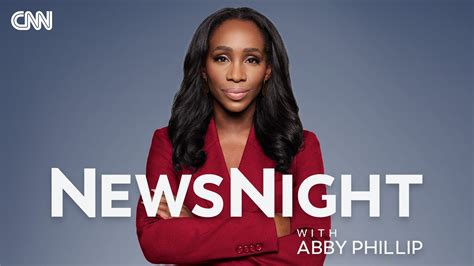
Abby Phillip, CNN anchor, sharply challenged a guest espousing MAGA viewpoints during a recent segment, repeatedly demanding direct answers to her questions regarding the implications of Donald Trump’s rhetoric on political violence. The exchange, characterized by Phillip’s assertive questioning and the guest’s attempts to pivot, highlighted the ongoing debate surrounding the responsibility of political leaders in shaping public discourse and preventing potential unrest.
The contentious interview occurred on CNN, where Phillip pressed the guest, identified as a supporter of the “Make America Great Again” movement, on whether Trump’s continued claims of a stolen election and his attacks on political opponents could incite violence. Phillip, known for her meticulous approach and direct questioning, repeatedly interrupted the guest’s attempts to deflect, emphasizing the need for a clear stance on the matter.
“Answer the question!” Phillip exclaimed at one point, as the guest attempted to shift the focus to other topics. This directness underscored the core of the debate: the extent to which political figures should be held accountable for the potential consequences of their words. The incident has sparked widespread discussion about media responsibility, the nature of political rhetoric, and the potential for such rhetoric to contribute to political polarization and violence.
According to Yahoo News, the specific point of contention revolved around Trump’s repeated assertions regarding the 2020 election and his characterization of certain political figures as enemies. Phillip sought to elicit a definitive statement from the guest on whether these statements could be construed as inciting or condoning violence. The guest, however, appeared hesitant to directly condemn Trump’s rhetoric, instead opting to highlight other factors contributing to the current political climate.
Throughout the segment, Phillip maintained a firm and persistent line of questioning, pressing the guest to acknowledge the potential dangers of Trump’s language. This assertive approach reflects a growing trend among journalists to hold political figures and their supporters accountable for their statements and actions, particularly in the context of increasing political division and concerns about the erosion of democratic norms.
The exchange underscores the challenges faced by media outlets in covering politically charged topics while maintaining objectivity and impartiality. Critics argue that aggressive questioning can be perceived as biased or unfair, while others maintain that it is essential for holding power accountable and ensuring that important questions are addressed.
The incident has also reignited debate about the role of social media in amplifying political rhetoric and the potential for online platforms to contribute to the spread of misinformation and hate speech. The exchange between Phillip and the guest quickly circulated online, generating a wide range of reactions and further fueling the ongoing debate about the state of American politics.
Many observers have praised Phillip’s assertive approach, arguing that it is necessary to challenge those who promote divisive rhetoric and perpetuate harmful narratives. Others have criticized her questioning as overly aggressive or biased, contending that it did not allow the guest to fully express their views.
Regardless of one’s perspective, the exchange serves as a stark reminder of the deep divisions within American society and the challenges faced by those seeking to bridge these divides. It also highlights the importance of critical thinking and media literacy in navigating an increasingly complex and polarized information landscape.
The interview took place against a backdrop of heightened political tensions and concerns about the potential for future political violence. The January 6th attack on the U.S. Capitol, which followed months of false claims about election fraud, served as a stark reminder of the potential consequences of unchecked political rhetoric.
Phillip’s questioning reflects a broader effort by journalists and media outlets to scrutinize the language and actions of political figures and to hold them accountable for their potential impact on society. This effort is particularly important in an era of increasing political polarization and the proliferation of misinformation and disinformation.
The segment featuring Abby Phillip and the MAGA-supporting guest highlights the complex and often contentious relationship between the media, political figures, and the public. It also underscores the importance of robust and independent journalism in holding power accountable and promoting informed public discourse.
The debate around Trump’s rhetoric and its potential impact on political violence is not new. Critics have long argued that his language can be interpreted as inciting violence, while supporters maintain that his words are often taken out of context or misinterpreted.
The incident involving Abby Phillip and the guest serves as a microcosm of this broader debate, highlighting the challenges of interpreting political rhetoric and assessing its potential consequences. It also underscores the importance of engaging in respectful and constructive dialogue, even when disagreements are deep and fundamental.
In the aftermath of the exchange, many observers have called for greater media literacy and critical thinking skills, arguing that these skills are essential for navigating the complex and often polarized information landscape. They also emphasize the importance of holding political figures accountable for their words and actions, and of promoting responsible and ethical communication practices.
The incident also raises questions about the role of social media platforms in regulating political rhetoric and preventing the spread of misinformation and hate speech. While these platforms have taken steps to address these issues, critics argue that more needs to be done to ensure that online spaces are not used to incite violence or spread harmful narratives.
The exchange between Phillip and the guest has generated a wide range of reactions, reflecting the deep divisions within American society. Some have praised Phillip for her assertive questioning, while others have criticized her for being overly aggressive or biased.
Regardless of one’s perspective, the incident serves as a reminder of the importance of engaging in respectful and constructive dialogue, even when disagreements are deep and fundamental. It also underscores the need for greater media literacy and critical thinking skills in navigating the complex and often polarized information landscape.
The events surrounding the interview between Abby Phillip and the MAGA guest highlight the ongoing challenges of covering politically charged topics while maintaining objectivity and impartiality. They also underscore the importance of holding power accountable and promoting informed public discourse.
Ultimately, the exchange between Phillip and the guest serves as a reflection of the broader political climate in the United States, characterized by deep divisions, heightened tensions, and concerns about the future of democracy. It also underscores the importance of robust and independent journalism in holding power accountable and promoting informed public discourse.
The incident occurred within a broader context of concerns about political violence and the erosion of democratic norms. The January 6th attack on the U.S. Capitol served as a stark reminder of the potential consequences of unchecked political rhetoric, and many observers have expressed concerns about the potential for future violence.
Phillip’s questioning reflects a growing effort by journalists and media outlets to scrutinize the language and actions of political figures and to hold them accountable for their potential impact on society. This effort is particularly important in an era of increasing political polarization and the proliferation of misinformation and disinformation.
The segment featuring Abby Phillip and the MAGA-supporting guest highlights the complex and often contentious relationship between the media, political figures, and the public. It also underscores the importance of robust and independent journalism in holding power accountable and promoting informed public discourse.
The debate around Trump’s rhetoric and its potential impact on political violence is not new. Critics have long argued that his language can be interpreted as inciting violence, while supporters maintain that his words are often taken out of context or misinterpreted.
The incident involving Abby Phillip and the guest serves as a microcosm of this broader debate, highlighting the challenges of interpreting political rhetoric and assessing its potential consequences. It also underscores the importance of engaging in respectful and constructive dialogue, even when disagreements are deep and fundamental.
Further Elaboration and Context:
The confrontational interview format has become increasingly prevalent in political journalism, particularly in cable news, where time constraints and the need to capture audience attention often prioritize heightened drama over nuanced discussion. This approach, while potentially effective in eliciting revealing moments from interviewees, also risks further polarizing the audience and contributing to a perception of media bias.
The specific points of contention during the interview reportedly included Trump’s repeated claims of election fraud, his use of inflammatory language to describe political opponents, and his past comments regarding the January 6th Capitol riot. Phillip’s line of questioning focused on whether the guest believed that Trump’s rhetoric had contributed to a climate of political violence and whether the guest would condemn such rhetoric unequivocally. The guest, according to reports, avoided directly answering these questions, instead attempting to redirect the conversation towards other issues or to offer justifications for Trump’s statements.
The role of cable news in shaping public discourse is a subject of ongoing debate. Critics argue that the 24-hour news cycle and the emphasis on opinion-based commentary can contribute to political polarization and the spread of misinformation. Proponents, on the other hand, maintain that cable news provides a valuable platform for diverse perspectives and for holding powerful figures accountable. The Abby Phillip interview exemplifies this tension, highlighting both the potential benefits and the potential drawbacks of cable news as a source of political information and analysis.
The interview’s impact extends beyond the immediate exchange between Phillip and the guest. It has become a focal point for broader discussions about media ethics, the responsibility of political leaders, and the future of American democracy. The incident serves as a reminder of the challenges facing the media in an era of increasing political polarization and the importance of promoting informed public discourse.
One can also explore the impact this type of interview format has on viewers. Does it encourage critical thinking, or does it simply reinforce pre-existing biases? Does it promote a better understanding of complex issues, or does it contribute to a climate of animosity and distrust? These are important questions to consider when evaluating the role of the media in shaping public opinion and promoting civic engagement.
The backdrop of the interview includes a nation grappling with significant challenges, including political polarization, economic inequality, and social unrest. These challenges have created a climate of uncertainty and anxiety, which can be exploited by political actors seeking to gain power or influence. The media plays a crucial role in informing the public about these challenges and in holding those in power accountable for their actions. However, the media also faces the challenge of maintaining objectivity and impartiality in an increasingly polarized environment.
The interview between Abby Phillip and the MAGA-supporting guest reflects the ongoing tensions between these competing forces. It highlights the importance of critical thinking, media literacy, and responsible communication in navigating the complexities of the modern political landscape.
FAQ Related to the News:
Q1: What was the central issue in the interview between Abby Phillip and the MAGA guest?
A1: The central issue was whether Donald Trump’s rhetoric, particularly his claims about the 2020 election and his attacks on political opponents, could be seen as inciting or condoning political violence. Abby Phillip pressed the guest to take a clear stance on this issue, while the guest appeared hesitant to directly condemn Trump’s language.
Q2: Why did Abby Phillip repeatedly interrupt the guest during the interview?
A2: Abby Phillip repeatedly interrupted the guest because she felt the guest was avoiding directly answering her questions and instead attempting to shift the focus to other topics. Phillip emphasized the need for a clear and direct response to the core issue of whether Trump’s rhetoric could incite violence.
Q3: What broader debates has this interview sparked?
A3: This interview has sparked debates about media responsibility, the nature of political rhetoric, the potential for political rhetoric to contribute to political polarization and violence, the role of social media in amplifying political rhetoric, and the importance of media literacy and critical thinking skills.
Q4: How does this interview reflect the current political climate in the United States?
A4: The interview reflects the deep divisions within American society, the heightened political tensions, and the concerns about the future of democracy. It also underscores the challenges faced by the media in covering politically charged topics while maintaining objectivity and impartiality.
Q5: What is the significance of the “MAGA” label in the context of this interview?
A5: “MAGA,” which stands for “Make America Great Again,” is a political slogan popularized by Donald Trump and associated with his supporters. In the context of the interview, the “MAGA” label signifies the guest’s affiliation with a specific political ideology and set of beliefs, which are often seen as controversial or divisive. The interview highlights the tensions and disagreements between those who support the “MAGA” movement and those who oppose it.









